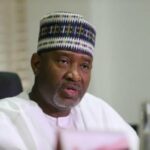
The current strike in the public universities is moving towards the seventh month and is likely to become the longest ever. What else can we expect from a government that is typically slow, typically uncaring about its citizens’ welfare and typically arrogant even in mismanagement? Fortunately, the government is ruling over a people that feel conquered and has accepted defeat. So, the people provide the environment that favours the government’s idiosyncrasies. Every sector of the economy is witnessing a downward trend and we all look hypnotised, longing for God’s intervention or miracle. Academic Staff Union of Universities, by the nature of such labour union, refused to be helpless like the rest of the society. The blackmail from the government now is that the lecturers want to be paid for a job not done and the public seems to have forgotten or are equally not asking whether the issues that led to the strike have been attended to. We shall return to that issue later.
The public primary and secondary schools that boast of experienced manpower have become unattractive to elites and even the poor who can afford or struggle to pay for mushroom private schools. The primary school and a large number of secondary school teachers deliberately do not have their children in such public schools. Even the hitherto much-respected Federal Government schools are not spared the decay. This is because the schools are underfunded, understaffed and under-equipped. Not just the teachers, which is more pathetic, but the elites found solace in sending their children to private schools and universities owned secondary schools, callously leaving the rotten primary and secondary schools for the wretched of the earth (apology to Frantz Fanon). Attempts in some cases to introduce fees into some secondary schools have resulted in increasing levels of dropouts who later become touts and thugs with corresponding long-run increased incidence of armed robbery, kidnapping and other such nefarious activities.
The fight for the soul of universities by ASUU has been on for a long time, possibly because most lecturers cannot afford to send their children abroad or to private universities and abandon the public universities for the children of the poor. More appropriately though is the fact that academics are conscious of the effect that the gradual and total destruction of the education sector of any economy signals its return to the stone age where barbarism rules. Any Nigerian who went through the Nigerian university in the last 40 years must have gone through one strike or another by ASUU. All members of my family went through strike actions because we are Nigerian-made. It has always been aluta continua with uncertain victory.
Contrary to the opinion of the members of the public that the children of the academic staff are in various garages across the country as touts or are schooling abroad or that they are in private universities, their children are in various public universities, particularly where their parents are teaching. Members of the public would say “These ASUU people should consider our children” or “our children are the ones they are just punishing.” I am aware that the children of the ASUU President, Professor Emmanuel Osodeke, have been at home with their parents just as the children of the immediate past president, Professor Biodun Ogunyemi, are with us in the same housing estate. Of course, the children of the Minister of Labour, Dr Chris Ngige, have also been at home with their housemaids and gardeners, probably in the belief that the system can still work.
The bone of contention is that universities in Nigeria should be well equipped to compete with universities in any part of the world. It should not be that Nigerian doctors, when employed abroad have to undergo retraining, particularly in practical as is the case presently. It should not be that Nigerian engineers cannot work as engineers in manufacturing businesses without going through tutelage at the hands of technicians from foreign countries. After 60 years of independence, Nigerian government cannot trust road construction with Nigerian civil engineers but had to give jobs to the Chinese who will send their technicians to lead Nigerian engineers to carry out the task. Nigerian-trained scientists cannot compete for grants with scientists from other countries, including scientists from African countries. Even the hardship undertaken by students studying in Nigeria, in terms of education infrastructure, is part of the ASUU concerns.
Every year, the budgetary allocation to education continues to reduce and the government continues to create political universities and other tertiary institutions. For this government, in particular, we need to check if it ever voted 10 per cent of the annual budget for education since it came on board in 2015. Every time the government wants to increase its consumption, the vote for education and health must be cut to accommodate increased spending on travel or feeding. One of the ways to stop the rot is to call attention to it. There have been many warning strikes to notify the government and the public of the compelling destruction of education in Nigeria, but we all moved on with pretence, counting on God for intervention. Quran 13 verse 11 says “Verily, never will Allah change the condition of a people until they change it themselves”. The same government that cannot finance education at home was reported to have provided 11 international research grants worth N61.3 million to a Malaysian university! Malaysia is ahead of us economically and scientifically, though we were better off in the early 1960s.
For fighting for the soul of the university system from total destruction, the public and the government are punishing the academics and their labour union. The government knows that ASUU as a labour union does not take subvention from it like some other unions but depends on the monthly dues from its members. So, holding the monthly salary will not only pauperise the lecturers and cause family disputes but also stifle the union of funds to carry out its activities. On both sides, the spirit would be broken. The public, the larger beneficiary if Nigeria has a sound education system, would say “Do they deserve to be paid for the work they did not do?” “Why are they asking for salary when they did not work?”. Of course, why should they be paid?
If the universities reopen today, the lecturers do not need to return to complete the missed semesters. They should just start where they should be now. All students who would have completed a session should start a new session at the next level. Those who were supposed to have graduated should be graduated without examination and results to determine their class of degree. Everything will be like hanging fruits. But the university system or any academic system does not work that way. If a university was in the first semester before the strike, the academic staff must go back to where the system stopped for proper records to be documented. Hanging teaching must be completed and examinations conducted with results released to determine the next level or class of degree in the case of graduation. The sacrifice the lecturers will have to make is to forfeit all annual leaves to fill the gaps.
On the statement by government that ASUU is asking for too much money. It is laced with deceit. ASUU members as staff are naturally entitled to their salaries. The issue of excess workload allowance also belongs to them as staff because that is the payment of overtime. Some staff, not all, have to carry more than they should in a particular semester or session due to shortage of staff and are supposed to be paid for that excess teaching hours. Any other money for development of the university goes to the account of the university to the spent by the governing council (largely government representatives) of the institution, not by ASUU as a union. So, why is government presenting the case as if it is the union that spends money?
The ranking of Nigerian universities globally, even in Africa, does not portray us as a serious country in this knowledge-driven world. The best university in Nigeria—the University of Ibadan—ranks 1196 and is not among the best five in Africa where South Africa rules and ex-Nigerian academics dominate. Another level of migration of young academics has just begun with the poor working conditions in our universities and attraction through scholarships from universities in advanced economies. Federal Government please take note.





